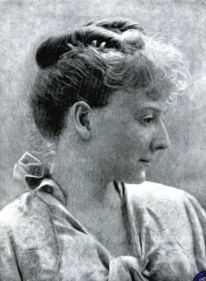Elisabeth von Heyking
Elisabeth von Heyking , née Elisabeth von Flemming , (* December 10, 1861 in Karlsruhe ; † January 4, 1925 in Berlin ), was a German writer , best known for her anonymous bestseller Letters that did not reach him (1903), a letter novel that reached its 46th edition in the year of publication and has been translated into numerous languages. In her novels she described life in higher society, which she knew well as a well-traveled diplomatic woman.
Life
Elisabeth Freifrau von Heyking was born in 1861 as the daughter of the Prussian ambassador to the Baden court, Albert Graf von Flemming , and his wife Armgart, née. von Arnim was born in Karlsruhe . She was the granddaughter of Bettina and Achim von Arnim . The writer Irene Forbes-Mosse was her younger sister.
In 1881 she married the economist and professor Stephan Gans zu Putlitz , who shot himself in 1883 because his wife wanted a divorce. In 1884 she married the Prussian diplomat Baron Edmund von Heyking from the Baltic aristocracy and moved with him to Florence. She had a daughter Stephanie from a first marriage and two sons, Alfred and Günther, from a second marriage. The circumstances of her second marriage had consequences, especially for her husband's career. For the next almost twenty years the couple was forced to a diplomatic wandering life and lived in Beijing, Valparaiso, Cairo, New York, Calcutta and Mexico, then from 1902 to 1906 in Hamburg, where her husband was Minister of Prussia for the Hanseatic cities. After her husband left the diplomatic service, the family lived in Baden-Baden from 1907. The Heyking couple, loyal to the emperor, supported Germany's hegemonic policy, such as efforts to establish a Chinese colony, as Germany finally wanted to acquire a “place at the great Chinese trough” (Elisabeth von Heyking in a letter to the German envoy in Copenhagen February 20, 1897).
As early as 1903 she had her greatest success with letters that did not reach him , which made her well-known and wealthy. The book had more than a hundred editions. In 1908 Elisabeth inherited the Flemmingsche Schloss Crossen on the White Elster north of Gera from a cousin who died childless . The 47-year-old moved here with her husband and developed a literary center here. The beginning of the First World War in 1914 changes a lot here too. Edmund von Heyking died in 1915, and her two sons died in the war in Flanders in 1917 . The diaries from four parts of the world , published a year after her death, are testimony to German foreign policy and German aspirations for great power, but at the same time offer a differentiated insight into Chinese culture. Heyking's descriptions and their attempts to do justice to China and its inhabitants are more nuanced than many other texts by their contemporaries.
Heyking died in 1925 and found her final resting place in the chapel of Crossen Castle in Crossen an der Elster . After her death, her heir, Edmund von Bockum-Dolff, sold all of the furniture, stoves and also the valuable Chinese silk wallpaper and let the castle fall into disrepair.
Works
- (anonymous :) Letters that did not reach him , 1903 (preprinted in 1902 in the Berliner Tälichen Rundschau ).
- (under the pseudonym “author of the letters that did not reach him ” :) The day of others. Roman , 1905.
- Ille mihi. Roman , 2 vols. 1912.
- Bye. A story from China's early spring , 1914.
- The organ pipes. From the land of the Baltic knights. Two stories , 1918.
- Love, diplomacy and wooden houses. A Balkan Fantasy from bygone days , 1919.
- The perfect happiness. Story , Verlag August Scherl, Berlin 1920.
- Weaver's fault. Novellas , 1921.
- (published from the estate :) Diaries from four parts of the world 1886/1904 , ed. by G. Litzmann, 1926.
literature
- Eckhard Schulz: Heyking, Elisabeth Baroness von, née Countess von Flemming. In: New German Biography (NDB). Volume 9, Duncker & Humblot, Berlin 1972, ISBN 3-428-00190-7 , p. 81 ( digitized version ).
- Herward Sieberg: Elisabeth von Heyking: A life like a novel. Olms Verlag, 2012. ISBN 978-3-487-14774-1 .
Web links
- Literature by and about Elisabeth von Heyking in the catalog of the German National Library
- Works by Elisabeth von Heyking in the Gutenberg-DE project
- Works by Elisabeth von Heyking at Zeno.org .
- Elisabeth von Heyking, letters that did not reach him; Tschun - A story from China's early spring
| personal data | |
|---|---|
| SURNAME | Heyking, Elisabeth von |
| ALTERNATIVE NAMES | Heyking, Elisabeth Freifrau von; Flemming, Elisabeth von (maiden name) |
| BRIEF DESCRIPTION | German writer and painter |
| DATE OF BIRTH | December 10, 1861 |
| PLACE OF BIRTH | Karlsruhe |
| DATE OF DEATH | January 4, 1925 |
| Place of death | Berlin |
